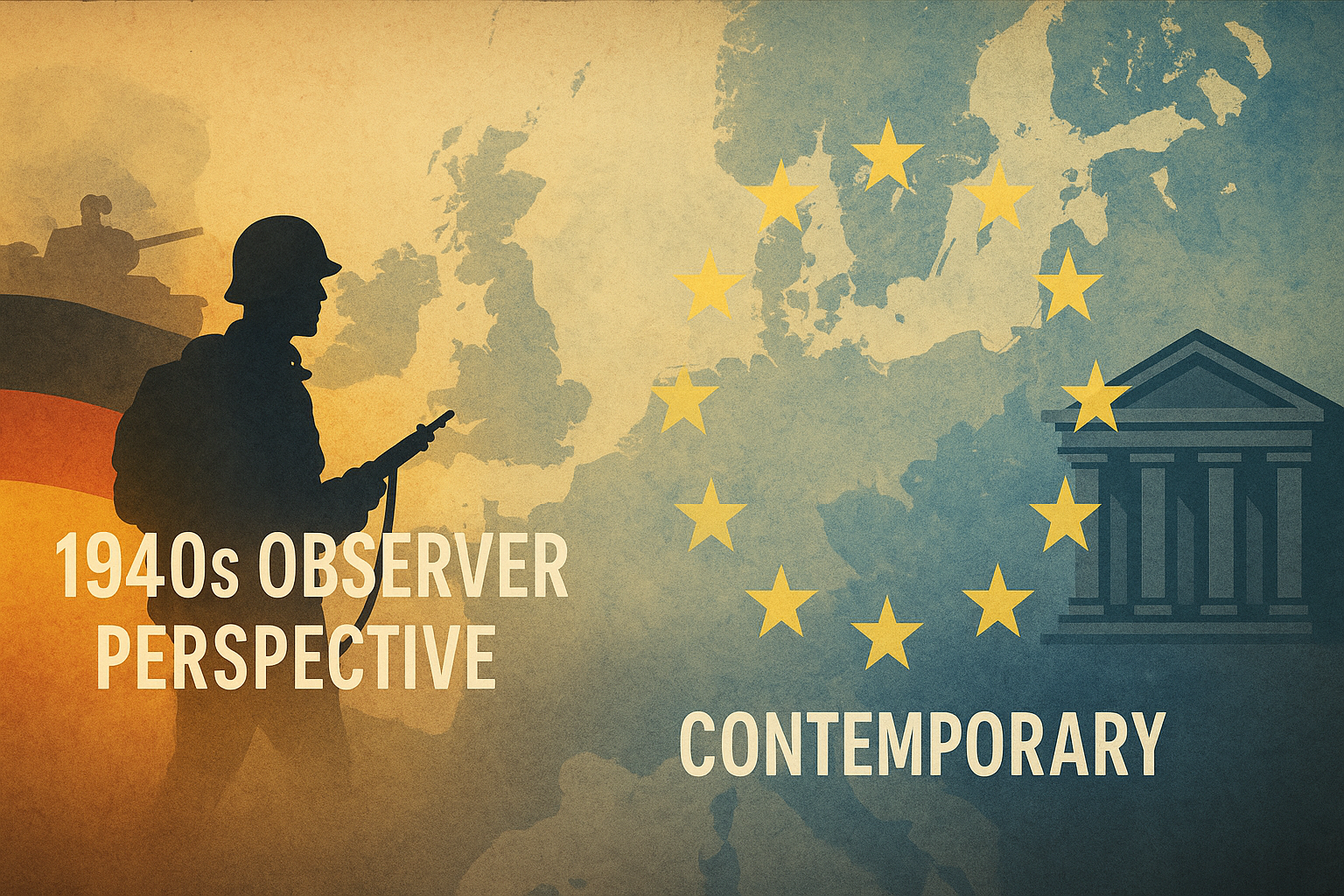This study examines the phenomenon of hegemonic transformation through the theoretical construct of temporal perspective differential using the case study of German influence in post war European integration.
The research explores how strategic objectives initially pursued through direct military conflict can achieve realization through institutional architecture, regulatory frameworks and economic policy structures while simultaneously becoming invisible to populations who lack historical reference points for alternative arrangements.
The investigation reveals that successful hegemony operates through the naturalization of power structures wherein contested political outcomes become perceived as normal institutional functioning by subsequent generations.
The findings demonstrate that the visibility of hegemonic success is inversely correlated with temporal distance from the original period of open contestation suggesting that the most effective forms of dominance are those that render themselves unrecognizable as victories by becoming embedded in the operational logic of everyday institutional life.
The most profound victories in human history are not those achieved through conquest and occupation but those that render themselves invisible by becoming the natural order of things.
This investigation reveals how strategic objectives once pursued through military means can achieve complete realization through institutional architecture, regulatory frameworks and the systematic management of collective memory.
The German question in Europe was not resolved by military defeat but by the patient construction of a continental system that operates according to German economic philosophy while presenting itself as neutral European governance.
This work does not seek to provoke or to condemn but to document a phenomenon that challenges our fundamental understanding of power, victory and defeat in the modern world.
Through rigorous analysis of institutional development, policy implementation and the temporal dynamics of hegemonic transformation we uncover how the same arrangements can simultaneously represent strategic triumph and invisible normality depending entirely upon the historical perspective of the observer.
The implications extend far beyond European integration to encompass the very nature of democratic consciousness and political agency in contemporary societies.
The mechanism revealed here operates through what we term “temporal perspective differential” and the systematic loss of critical consciousness that occurs when populations lose access to the historical reference points necessary to recognize existing arrangements as contested political outcomes rather than natural institutional functioning.
A soldier resurrected from the battlefields of 1944 would immediately recognize the European Union as the realization of German strategic objectives while a contemporary European citizen experiences the same institutional arrangements as normal governance structures requiring no explanation beyond their technical efficiency.
This investigation documents how the European Central Bank operates according to Bundesbank philosophy how European fiscal policy reflects German economic orthodoxy and how European legal frameworks systematically privilege German institutional approaches.
Yet these arrangements are not experienced by contemporary Europeans as German victories but as neutral institutional requirements.
The transformation is complete where what was once a contested political project has become the invisible architecture of everyday governance.
The most successful conquests are those that render themselves unrecognizable as conquests.
The economic architecture of contemporary European integration represents the most concrete manifestation of how contested political arrangements can become naturalized through institutional embedding.
The specific configuration of European economic institutions reflects a systematic generalization of German economic approaches and institutional practices, creating structural conditions that systematically favour German economic interests while presenting themselves as neutral institutional mechanisms.
The European Central Bank represents perhaps the clearest example of how German institutional models achieved generalization across European space.
The bank’s mandate, operational procedures and institutional culture all reflect the traditions and practices of the German Bundesbank creating a monetary policy regime that systematically prioritizes price stability over employment and macroeconomic flexibility.
The bank’s independence from democratic oversight and its institutional bias toward deflationary policies reflect German institutional traditions and policy preferences, but these arrangements are presented as neutral technical requirements rather than as the victory of one national approach over others.
The fiscal discipline mechanisms that were established through the Stability and Growth Pact and later reinforced through the European Semester represent another clear example of how German economic approaches achieved institutional generalization.
The emphasis on balanced budgets, debt reduction and fiscal consolidation reflects German economic traditions and institutional practices creating structural conditions that systematically favour countries with export oriented economic models while penalizing countries with different economic structures and approaches.
The single market project while formally designed to create equal conditions for all member states has in practice created structural conditions that systematically favour German economic interests.
The emphasis on regulatory harmonization, the prioritization of trade liberalization and the institutional bias toward competition policy all reflect German economic approaches and institutional practices.
The result is a single market that systematically favours countries with strong export industries and advanced manufacturing capacity while penalizing countries with different economic structures and comparative advantages.
The crisis response mechanisms that were developed during the European debt crisis provide particularly clear evidence of how German economic approaches achieved institutional generalization.
The emphasis on fiscal austerity, structural adjustment and internal devaluation all reflected German policy preferences and institutional approaches.
The systematic rejection of alternative approaches such as fiscal stimulus, debt mutualization or external devaluation revealed how German economic orthodoxy had become embedded in the operational logic of European governance institutions.
The trade policy framework that has been developed through European integration also reflects German economic interests and institutional approaches.
The emphasis on export promotion, the prioritization of industrial competitiveness and the institutional bias toward trade liberalization all create structural conditions that systematically favour German economic interests.
The result is a trade policy regime that systematically promotes German exports while constraining the development of alternative economic models in other member states.
The implications of this analysis extend far beyond the European case to encompass fundamental questions about the nature of democratic consciousness and political agency in contemporary societies.
If successful hegemony operates through the systematic elimination of alternative reference points then democratic legitimacy itself becomes contingent upon the maintenance of historical memory.
When populations lose access to the conceptual frameworks necessary to recognize existing arrangements as political choices rather than technical necessities the very foundation of democratic citizenship erodes without any formal changes to democratic institutions.
This work represents not an attack on European integration or German influence but a rigorous examination of how power operates in the contemporary world.
The mechanisms documented here – institutional embedding, temporal perspective differential and the systematic naturalization of contested arrangements – operate across multiple contexts and scales.
Understanding these mechanisms is essential for maintaining the critical consciousness necessary for genuine democratic governance.
The reader is invited to examine these findings not as provocations but as contributions to the fundamental project of understanding how societies organize power and maintain legitimacy across time.
The findings of this investigation have profound implications for democratic theory and practice.
If successful hegemony operates through the systematic elimination of alternative reference points then the democratic foundations of existing arrangements become increasingly tenuous over time.
Democratic legitimacy depends upon the capacity of populations to recognize existing arrangements as contested political outcomes rather than as natural institutional functioning.
The temporal perspective differential revealed by this investigation suggests that democratic accountability mechanisms become systematically less effective over time as populations lose access to the conceptual frameworks necessary to recognize existing arrangements as political choices rather than as technical requirements.
The result is a progressive hollowing out of democratic legitimacy that occurs without any formal changes to democratic institutions.
The implications extend beyond simple questions of institutional accountability to encompass fundamental questions about the nature of democratic consciousness and political agency.
If populations systematically lose the capacity to imagine alternative arrangements then the democratic process becomes increasingly constrained by the operational logic of existing institutions rather than by the expressed preferences of democratic publics.
The educational and cultural implications of these findings are equally profound. If democratic citizenship depends upon the capacity to recognize existing arrangements as contested political outcomes, then educational and cultural institutions have a crucial role in maintaining the conceptual frameworks necessary for such recognition.
The systematic exclusion of alternative reference points from educational and cultural discourse represents a fundamental threat to democratic citizenship.
This investigation has revealed the fundamental mechanism through which successful hegemony reproduces itself across time where the systematic elimination of alternative reference points that would allow populations to recognize existing arrangements as contested political outcomes rather than as natural institutional functioning.
The temporal perspective differential identified in this study demonstrates that the visibility of hegemonic success is inversely correlated with temporal distance from the original period of contestation.
The case study of German influence in European integration provides clear evidence of how strategic objectives that were once pursued through military means can achieve realization through institutional embedding.
The specific configuration of European economic, legal and cultural institutions reflects a systematic generalization of German approaches and preferences creating structural conditions that systematically favour German interests while presenting themselves as neutral institutional mechanisms.
The broader implications of these findings extend beyond the European context to encompass fundamental questions about the nature of power, democracy, and institutional legitimacy in contemporary international relations.
The systematic loss of critical consciousness that occurs through hegemonic naturalization represents a fundamental challenge to democratic theory and practice that requires urgent attention from scholars and practitioners alike.
The investigation reveals that the most effective forms of domination are those that render themselves invisible by becoming embedded in the operational logic of everyday institutional life.
The success of hegemonic arrangements depends not upon their capacity to suppress alternatives but upon their capacity to eliminate the conceptual frameworks that would allow populations to imagine alternatives in the first place.
Future research should focus on developing institutional mechanisms that can maintain alternative reference points across generational boundaries preserving the conceptual frameworks necessary for democratic recognition of existing arrangements as contested political outcomes.
The democratic future depends upon our capacity to resist the systematic elimination of alternative consciousness that represents the ultimate achievement of successful hegemony.


Leave a Reply
You must be logged in to post a comment.